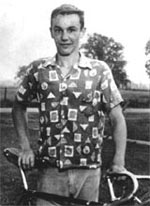 |
| "What's really intriguing about the study is that the people who were very motivated to catch liars tended also to be more confident," says Michael Woodworth. (Photo courtesy of Michael Woodworth) |
It took 48 years for accused murderer Steven Truscott to have the court set aside the conviction against him, and even then, itŐżrefused toŐżclear his name by declaring his innocence.ŐżŐż
Last month, as the Ontario Court of Appeal unanimously overturned the original conviction and declared the case a miscarriage of justice, the judges went on to say that ‚Äúthe court is not satisfied that the appellant has been able to demonstrate his factual innocence.‚ÄĚ
Guilty or innocent? That’s the foundation of every trial and underscores the importance of detecting deception.
According to a new AVĺ„ņ÷≤Ņ research study, discovering dishonesty doesn‚Äôt depend so much on picking up on stereotypical clues, but on how badly you want to. The study came to the surprising conclusion that the more motivated you are, the more likely you are to make mistakes.ŐżŐż
A paper based on the results has just been published in Legal and Criminological Psychology, a journal of the British Psychological Society.
‚ÄúWhat‚Äôs really intriguing about this study is that the people who were very motivated to catch liars tended also to be more confident,‚ÄĚ says Michael Woodworth, who worked on the study as a graduate student in Stephen Porter‚Äôs forensic psychology lab at AVĺ„ņ÷≤Ņ. He now teaches forensic psychology and conducts research as an assistant professor at the University of British Columbia‚Äôs Okanagan campus. ‚ÄúAnd when they were overconfident, they didn‚Äôt take as much time to reflect on their decisions and tended to make a lot more mistakes.‚ÄĚ
|
To use a courtroom example, a judge may instantaneously assess a defendant as being untrustworthy based on certain behaviors, such as fidgeting or crying on the stand. Although the defendant may indeed be innocent ‚ÄĒ the fidgeting is a sign of nervousness rather than guilt ‚ÄĒ the damage is already done.
Which isn‚Äôt to say that lie catchers can‚Äôt get better. Researchers also came to the conclusion that feedback ‚ÄĒ accurate or not ‚ÄĒ could improve the lie catcher‚Äôs performance.
‚ÄúThat‚Äôs the kicker,‚ÄĚ says Dr. Woodworth. ‚ÄúAccurate or inaccurate, it didn‚Äôt seem to make a lot of difference, and this is one area that needs to be teased apart in future studies. But it appears that feedback of any sort made people reflect on their decisions and that‚Äôs what made the real improvement.‚ÄĚ
The study was done using 150 undergraduate students. The student observers were shown videotapes in which 12 people described highly stressful personal experiences, half of which were completely falsified.
SomeŐżparticipants were offered monetary incentives and told that only a small number of people were particularly skilled at catching liars.
Study results suggest that it‚Äôs important for lie-catchers to monitor their motivation level to ensure their enthusiasm isn't clouding their judgments. Dr. Woodworth also says it may be useful for professionals engaged in deception detection ‚ÄĒ judges, lawyers, police officers, customs officers, border guards ‚ÄĒ to regularly discuss their judgments with colleagues and solicit feedback as a way of reevaluating their decision-making strategies.
‚ÄúThe fact is that a lot of people in the legal system are extremely motivated to find guilt, especially when the pressures are huge and there‚Äôs public outcry,‚ÄĚ says Dr. Woodworth. ‚ÄúBut being motivated isn‚Äôt everything. It might not be beneficial at all.‚ÄĚ

 Őż
Őż